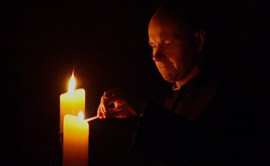 Religion can provide a “cure for the soul” by educating people to be self-aware and accepting that their inner world has an impact on the world outside, Friar Christopher Jamison, abbot of Worth Abbey and star of the BBC documentary series The Monastery told the Royal College of Psychiatrists’ Annual Meeting this week.
Religion can provide a “cure for the soul” by educating people to be self-aware and accepting that their inner world has an impact on the world outside, Friar Christopher Jamison, abbot of Worth Abbey and star of the BBC documentary series The Monastery told the Royal College of Psychiatrists’ Annual Meeting this week.
Friar Jamison said that, while psychiatry had made “immense” strides in improving the cure of minds, hearts and bodies, there is still a “cure of souls” that is specific to religion. This cure lay in the development of self awareness, a lack of which was bad for mental health, he said. A more self-aware Britain would be a mentally healthier one. [continue reading…]
 Teachers are important partners to health professionals in identifying and managing children with attention-deficit hyperactivity disorder (ADHD). However, they may be over-identifying children with possible ADHD diagnoses.
Teachers are important partners to health professionals in identifying and managing children with attention-deficit hyperactivity disorder (ADHD). However, they may be over-identifying children with possible ADHD diagnoses.
Diagnostic criteria for ADHD require that the symptoms are present both at school and at home. School assessments are generally carried out by rating scales and school reports. [continue reading…]
A new treatment programme for cancer patients with depression can significantly boost their quality of life.
University of Edinburgh scientists devised the programme which offers patients one-to-one sessions with specially trained cancer nurses.
After three months of receiving the new treatment, almost 20 per cent fewer patients were depressed compared with those who received standard NHS treatment.
The difference was still evident after one year.
This new treatment could substantially improve the way we manage depression in people with cancer – Professor Michael Sharpe, Director of Psychological Medicine Research
The study, published in the Lancet, recruited 200 cancer patients with clinical depression.
Half were given standard care for depression, the other half received the special programme which entailed:
- sessions on understanding depression and the effects of antidepressants;
- problem-solving therapy to help overcome feelings of helplessness;
- liaison between oncologist and GP to collaborate in treatment of depression;
- monthly monitoring of progress by telephone
- providing optional “booster” sessions
Patients who were treated in this way also experienced an improvement in anxiety and fatigue.
Source: University of Edingburgh

Â
One billion young people today are maturing emotionally, connecting socially and exploring their sexuality. To help them avoid risky behaviors, researchers first have to understand them.
Around the globe, more than 1 billion young people, ages 15 to 24, are making the often-difficult transition to adulthood. They are changing physically, maturing emotionally, connecting socially and having sex with each other. But the consequences aren’t as simple as they may once have been. The global economy is changing, and in most countries, young people need higher education to keep pace economically. As a result, the age of marriage is drifting upward. More adolescents are finding themselves exploring their sexuality outside of marriage, resulting in more out-of-wedlock pregnancies and births.Â
Link to read more:
Generation Sex
Understanding Teens
Helping Teens
Source: Johns Hopkins Bloomberg School of Public Health
Image credit
 Religion can provide a “cure for the soul” by educating people to be self-aware and accepting that their inner world has an impact on the world outside, Friar Christopher Jamison, abbot of Worth Abbey and star of the BBC documentary series The Monastery told the Royal College of Psychiatrists’ Annual Meeting this week.
Religion can provide a “cure for the soul” by educating people to be self-aware and accepting that their inner world has an impact on the world outside, Friar Christopher Jamison, abbot of Worth Abbey and star of the BBC documentary series The Monastery told the Royal College of Psychiatrists’ Annual Meeting this week.

